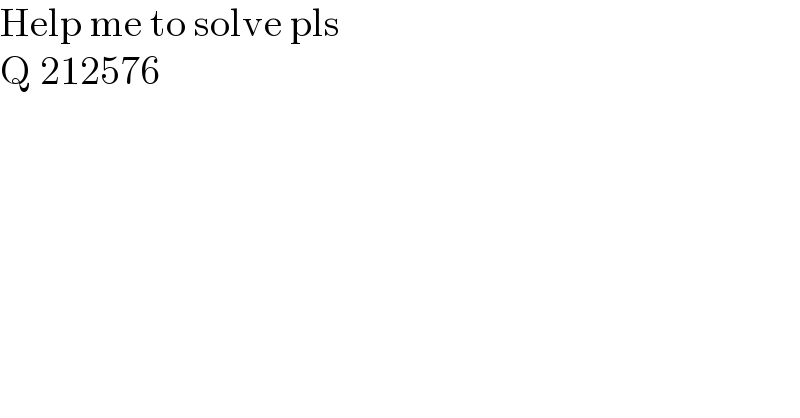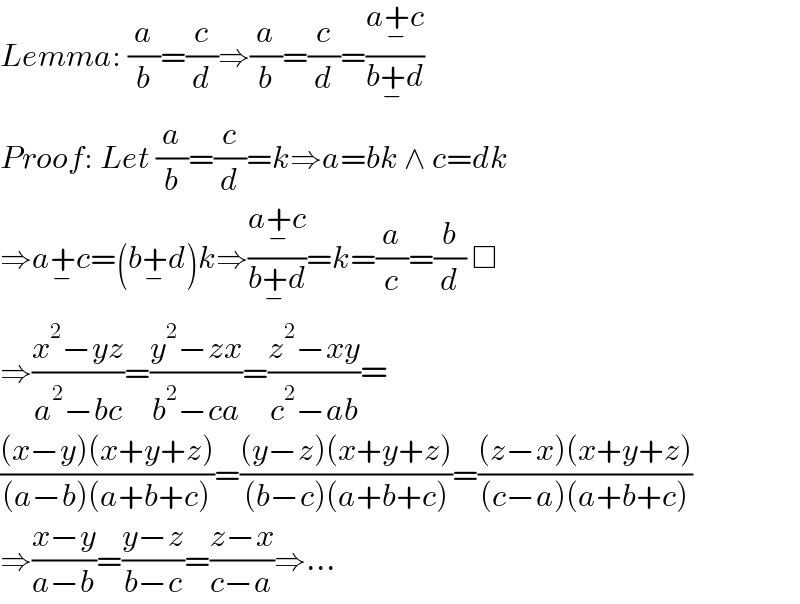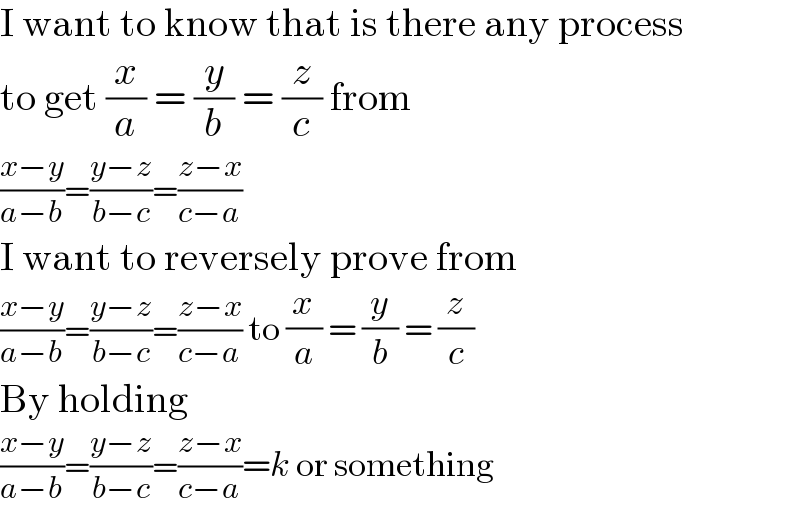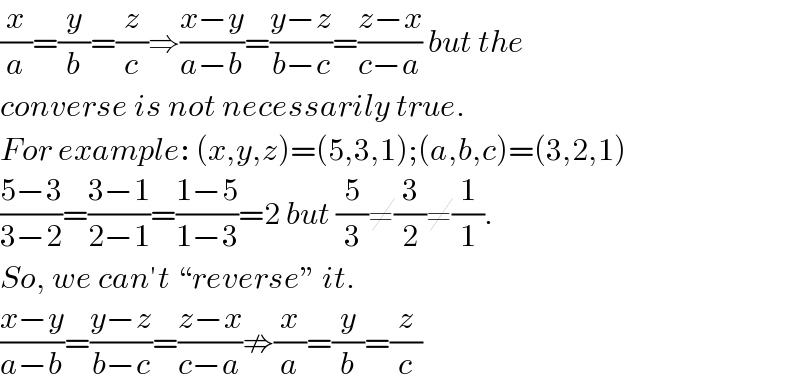
Question Number 212598 by MATHEMATICSAM last updated on 18/Oct/24

$$\mathrm{Help}\:\mathrm{me}\:\mathrm{to}\:\mathrm{solve}\:\mathrm{pls} \\ $$$$\mathrm{Q}\:\mathrm{212576}\: \\ $$
Answered by A5T last updated on 18/Oct/24

$${Lemma}:\:\frac{{a}}{{b}}=\frac{{c}}{{d}}\Rightarrow\frac{{a}}{{b}}=\frac{{c}}{{d}}=\frac{{a}\underset{−} {+}{c}}{{b}\underset{−} {+}{d}} \\ $$$${Proof}:\:{Let}\:\frac{{a}}{{b}}=\frac{{c}}{{d}}={k}\Rightarrow{a}={bk}\:\wedge\:{c}={dk} \\ $$$$\Rightarrow{a}\underset{−} {+}{c}=\left({b}\underset{−} {+}{d}\right){k}\Rightarrow\frac{{a}\underset{−} {+}{c}}{{b}\underset{−} {+}{d}}={k}=\frac{{a}}{{c}}=\frac{{b}}{{d}}\:\Box \\ $$$$\Rightarrow\frac{{x}^{\mathrm{2}} −{yz}}{{a}^{\mathrm{2}} −{bc}}=\frac{{y}^{\mathrm{2}} −{zx}}{{b}^{\mathrm{2}} −{ca}}=\frac{{z}^{\mathrm{2}} −{xy}}{{c}^{\mathrm{2}} −{ab}}= \\ $$$$\frac{\left({x}−{y}\right)\left({x}+{y}+{z}\right)}{\left({a}−{b}\right)\left({a}+{b}+{c}\right)}=\frac{\left({y}−{z}\right)\left({x}+{y}+{z}\right)}{\left({b}−{c}\right)\left({a}+{b}+{c}\right)}=\frac{\left({z}−{x}\right)\left({x}+{y}+{z}\right)}{\left({c}−{a}\right)\left({a}+{b}+{c}\right)} \\ $$$$\Rightarrow\frac{{x}−{y}}{{a}−{b}}=\frac{{y}−{z}}{{b}−{c}}=\frac{{z}−{x}}{{c}−{a}}\Rightarrow... \\ $$
Commented by MATHEMATICSAM last updated on 18/Oct/24

$$\mathrm{I}\:\mathrm{want}\:\mathrm{to}\:\mathrm{know}\:\mathrm{that}\:\mathrm{is}\:\mathrm{there}\:\mathrm{any}\:\mathrm{process} \\ $$$$\mathrm{to}\:\mathrm{get}\:\frac{{x}}{{a}}\:=\:\frac{{y}}{{b}}\:=\:\frac{{z}}{{c}}\:\mathrm{from}\: \\ $$$$\frac{{x}−{y}}{{a}−{b}}=\frac{{y}−{z}}{{b}−{c}}=\frac{{z}−{x}}{{c}−{a}} \\ $$$$\mathrm{I}\:\mathrm{want}\:\mathrm{to}\:\mathrm{reversely}\:\mathrm{prove}\:\mathrm{from} \\ $$$$\frac{{x}−{y}}{{a}−{b}}=\frac{{y}−{z}}{{b}−{c}}=\frac{{z}−{x}}{{c}−{a}}\:\mathrm{to}\:\frac{{x}}{{a}}\:=\:\frac{{y}}{{b}}\:=\:\frac{{z}}{{c}} \\ $$$$\mathrm{By}\:\mathrm{holding}\: \\ $$$$\frac{{x}−{y}}{{a}−{b}}=\frac{{y}−{z}}{{b}−{c}}=\frac{{z}−{x}}{{c}−{a}}={k}\:\mathrm{or}\:\mathrm{something} \\ $$
Commented by A5T last updated on 18/Oct/24

$$\frac{{x}}{{a}}=\frac{{y}}{{b}}=\frac{{z}}{{c}}\Rightarrow\frac{{x}−{y}}{{a}−{b}}=\frac{{y}−{z}}{{b}−{c}}=\frac{{z}−{x}}{{c}−{a}}\:{but}\:{the}\: \\ $$$${converse}\:{is}\:{not}\:{necessarily}\:{true}. \\ $$$${For}\:{example}:\:\left({x},{y},{z}\right)=\left(\mathrm{5},\mathrm{3},\mathrm{1}\right);\left({a},{b},{c}\right)=\left(\mathrm{3},\mathrm{2},\mathrm{1}\right) \\ $$$$\frac{\mathrm{5}−\mathrm{3}}{\mathrm{3}−\mathrm{2}}=\frac{\mathrm{3}−\mathrm{1}}{\mathrm{2}−\mathrm{1}}=\frac{\mathrm{1}−\mathrm{5}}{\mathrm{1}−\mathrm{3}}=\mathrm{2}\:{but}\:\frac{\mathrm{5}}{\mathrm{3}}\neq\frac{\mathrm{3}}{\mathrm{2}}\neq\frac{\mathrm{1}}{\mathrm{1}}. \\ $$$${So},\:{we}\:{can}'{t}\:``{reverse}''\:{it}. \\ $$$$\frac{{x}−{y}}{{a}−{b}}=\frac{{y}−{z}}{{b}−{c}}=\frac{{z}−{x}}{{c}−{a}}\nRightarrow\frac{{x}}{{a}}=\frac{{y}}{{b}}=\frac{{z}}{{c}} \\ $$
Commented by Rasheed.Sindhi last updated on 19/Oct/24

$$\frac{\left({x}−{y}\right)\left({x}+{y}+{z}\right)}{\left({a}−{b}\right)\left({a}+{b}+{c}\right)}=\frac{\left({y}−{z}\right)\left({x}+{y}+{z}\right)}{\left({b}−{c}\right)\left({a}+{b}+{c}\right)}=\frac{\left({z}−{x}\right)\left({x}+{y}+{z}\right)}{\left({c}−{a}\right)\left({a}+{b}+{c}\right)} \\ $$$$\:\:\overset{{why}} {\Rightarrow}\:\:\:\frac{{x}−{y}}{{a}−{b}}=\frac{{y}−{z}}{{b}−{c}}=\frac{{z}−{x}}{{c}−{a}} \\ $$
Commented by MATHEMATICSAM last updated on 19/Oct/24

$$\mathrm{He}\:\mathrm{cancelled}\:\frac{{x}\:+\:{y}\:+\:{z}}{{a}\:+\:{b}\:+\:{c}}\:\mathrm{which}\:\mathrm{is}\:\mathrm{not}\:\mathrm{equal} \\ $$$$\mathrm{to}\:\mathrm{0}. \\ $$
Commented by Rasheed.Sindhi last updated on 19/Oct/24

$${Ok},\:{thanks}! \\ $$
